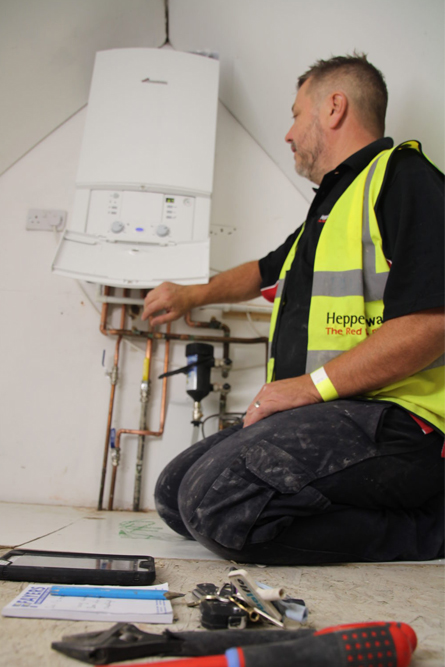5 Essential Tips for DIY Boiler Repair
5 Essential Tricks for DIY Boiler Repair Boilers are an essential part of any home, offering warmth and hot water for your everyday wants. When your boiler breaks down, it may be a real headache, not to talk about an costly one. But fear not! With a small little bit of know-how and some handy tips, you can save yourself time, cash, and tension by tackling the issue yourself. 1. Security First: Before you also think about beginning a DIY boiler repair, always prioritize security. Make sure to change off the boiler and disconnect it from the power supply. Don't ignore to change off the gas supply while well. Often wear protective equipment such seeing that gloves and goggles to avoid any mishaps. Your security should end up being the number one priority. 2. Diagnose the Problem: The following stage in your DIY boiler restoration is to recognize the concern. Is it a leak No heat Strange noises By understanding the problem, you can narrow down the possible causes and find the appropriate option. Check for obvious indicators, such as water puddles or a lack of pressure. If you're unsure, consult your boiler's manual or reach out to a professional for guidance. 3. Gather the Right Equipment: A convenient DIYer always offers the right equipment on hands. Invest in a simple toolkit that includes a wrench, screwdrivers, pliers, and a multimeter. These tools will arrive in handy for various restoration tasks, such simply because tightening loose cable connections, changing faulty parts, or testing electrical circuits. Having the correct tools will save you period and irritation in the lengthy run. 4. Seek Expert Tips: While DIY boiler repair may be empowering, there are limits to what you may deal with. If you're unsure about any aspect of the repair procedure or if the problem seems too complex, it's necessary to seek expert advice. Professional boiler engineers possess the expertise and knowledge to diagnose and fix more complicated issues safely. Don't hesitate to contact in the specialists when needed – it could conserve you from making costly errors. 5. Regular Maintenance: Prevention is certainly better than treatment, and this rings accurate for boilers as well. Regular maintenance is usually key to keeping your boiler in good functioning condition and staying away from unforeseen breakdowns. Timetable annual servicing by a experienced engineer who can detect and address any potential problems before they escalate. Additionally, maintain an eyesight on the pressure gauge and the pilot light. If you notice any abnormalities, take immediate action. Right now that you're equipped with these essential ideas for DIY boiler repair, you're prepared to deal with any boiler problem that comes your method. Remember, safety should always be your top concern, and if in question, don't hesitate to seek expert suggestions. With the right tools and understanding, you can save yourself time, money, and tension while ensuring your house remains warm and comfortable. Expanding on the Subject: 1. Boiler Leak Detection: Leakages are a common however tricky issue when it comes to boilers. They may cause harm to surrounding structures and lead to costly maintenance. Identifying the supply of a leak requires a willing eye and a systematic strategy. Start by looking at all noticeable pipes and contacts for indications of wetness or corrosion. If the drip persists, it may be required to disassemble particular parts to gain access to concealed areas. Remember to always wear protective gear and take necessary precautions when operating with leaks. 2. Troubleshooting Heating system Issues: Can be your boiler failing to provide sufficient heat Several factors can be accountable for this problem. Verify the thermostat to guarantee it is arranged to the desired temperature and working correctly. Additionally, inspect the radiators, bleed them if required, and guarantee they are not really obstructed by furniture or curtains. If none of these guidelines solve the concern, it may be time to examine the boiler's elements, such as the pump, valves, or electric motor, which could be malfunctioning. 3. Dealing with Noisy Boilers: Unusual noises arriving from your boiler may indicate underlying complications. Rattling, banging, or whistling sounds are often associated with limescale buildup, trapped surroundings, or faulty parts. Begin by bleeding the radiators to release trapped air flow. If the sound persists, it may end up being required to descale the boiler using an appropriate descaling solution. In some cases, you may need to replace worn-out or faulty parts, such while the fan or temperature exchanger. 4. Dealing with Pilot Light Problems: The pilot light is definitely a crucial element of a boiler, responsible for igniting the burner to make heat. If the pilot light goes out, the boiler will fail to function. Verify the pilot light to make sure it is certainly lit and the flame is stable and blue. If the light keeps going out, there may be an concern with the thermocouple or gas source. Clean the thermocouple or replace it if required. If the issue persists, it's greatest to consult a professional while working with gas-related problems requires expertise and caution. 5. Maintaining Performance: A well-maintained boiler also means improved energy efficiency, which can save you money on utility bills. Frequently clean the boiler's heat exchanger and assure it is free from particles or sediment accumulation. Insulate shown pipes to minimize heat loss. Plumbing & heating Consider installing a programmable thermostat or a clever heating program to optimize your energy usage. By remaining proactive and implementing these methods, you can maximize your boiler's efficiency and reduce your carbon footprint. By following these guidelines and growing your DIY boiler restoration knowledge, you can handle a wide range of issues and make certain your boiler is working effectively. Keep in mind, a small proactive maintenance can go a long way in keeping your house warm and comfortable. 